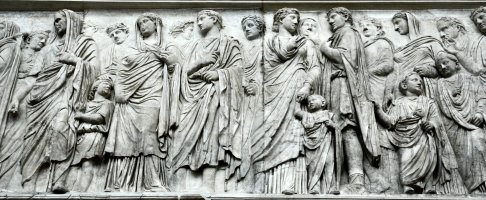This is the story of Julius Caesar's great nephew and heir who was only eighteen on the Ides of March 44 BC. Then called Caius Octavius, he took the name Caesar, fought his way to power through massacre and civil war and by 30 BC was left unchallenged as the most powerful man in the Roman Republic. He created a new political system, a monarchy in all but name, and was awarded the name Augustus as one of many honours granted to him by the Senate. For the next forty-four years his rule was never seriously challenged and when he died in AD 14 his position passed to his adopted son Tiberius.
Augustus lived a long and extremely full life, rising from teenage warlord to revered elder statesman and father of his country - another of the honours bestowed by a fawning Senate. His greatest achievement was to give Rome and the empire internal peace and stability after decades of political violence and civil wars. Poetry and art all celebrated Augustan peace and at the same time revelled in the last intensive period of Roman expansion.
For a flavour of this man's remarkable life here is an article I wrote for the journal ad familiares: 'Augustus - two thousand years on'
Errata
It's inevitable for any author that almost the first thing you spot when opening the first copy of your latest book is a typographic error. No matter how many times you and other people check things, a few always seem to slip through. The marvellous family trees included at the back of Augustus were drawn up for my by David Breeze. A few errors crept in when these were laid out by the publishers, and sadly I failed to spot them when checking the proofs. These should be corrected for the paperback edition, but for the moment we wanted to list them on the website.
The Second Triumvirate and the Inter-Connected Relationships of their Descendants - M. Antonius' dates are given as 83-80, when of course it should be 83-30.
The Cousins of Augustus - The lines showing the children of Julius Caesar, d. 85 should run to Julia and to Julia rather than to their husbands.
The Family of Augustus, Livia and Octavia on the death of M. Antonius in 30 BC - The lines showing Livia's and Octavia's children do not really need to overlap. As this has been done, then the lineto Marcellus should be broken to make clear that there is no relation to Tiberius and Drusus.
The Family of Agrippa - (i) The five children of Agrippa and Julia (Caius, Julia, Lucius, Agrippina and Agrippa Postumus) have incorrectly been attributed to Tiberius and Julia.
(ii) There ought to be a line showing that Marcella Major was the daughter of Octavia is missing.





